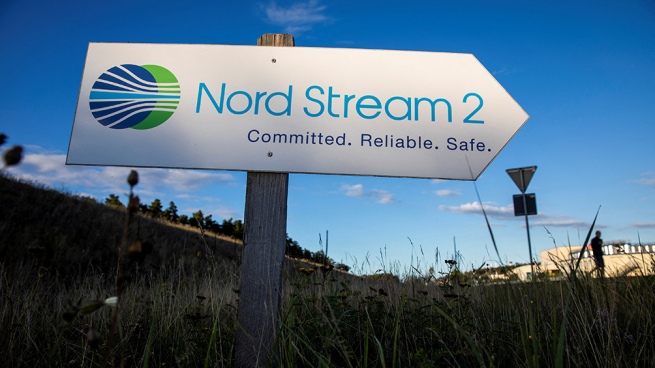International analyst
After last Sunday the 12th the German Foreign Minister, Annalena baerbock, declared in a report on the second public TV channel (ZDF) that the gas pipeline Nord Stream 2 “still cannot be authorized”Gas prices in Europe have risen again considerably, benefiting importers of liquefied natural gas (LNG) from the US, and European deposits remain half empty.
The price of gas reached a new record this Monday. The contracts for December 14 reached a record value of 118 euros per megawatt hour (MWh) in the afternoon. This is a good ten percent more than on Friday. Industry observers cited the foreign minister’s statements as a reason for the rise.
When interviewed by the news outlet Heute Journal by ZDF, she stressed that the pipeline “does not meet the requirements of European energy legislation and, in any case, safety issues remain unresolved.”
In their coalition agreement the Social Democratic Party (SPD), the Greens and the Liberal Democratic Party (FDP) determined that energy projects are subject to European legislation, “and that means that, as things stand, this pipeline cannot be approved because it does not meet the requirements of European energy legislation and anyway, the safety issues remain unresolved,” stated the policy of the Greens. The argument is that the Nord Stream AG consortium is registered as a Swiss company and not in an EU country, but this is not new: it was known since the German state accepted the laying of the connection.
Where, then, are the principle of legal continuity and the obligation of States to fulfill their commitments?
Baerbock added that the US and the previous German government had argued “that in the event of further escalations of tension in Eastern Europe, this pipeline could not be connected to the grid.” He was referring to the tense situation on the border between Russia and Ukraine.
The gas pipeline from Russia to Germany was completed weeks ago. The Federal Network Agency has until the beginning of January to decide on its operating permit through which up to 55,000 million cubic meters of natural gas will be supplied annually from Russia to Germany.
The current minister had spoken out against Nord Stream 2 already during the electoral campaign prior to the Bundestag elections. However, the new Chancellor Olaf Scholz has not yet taken a clear position on this.
The most likely scenario is that the final regulatory confirmation could extend to the end of the third quarter or even the fourth quarter of 2022, but, if the conflict between Russia and NATO over Ukraine intensifies, pressure from the United States and Eastern European states on the German government to freeze the project is likely to increase.
For the Greens and Annalena Baerbock this would be a great foreign policy success. The government’s decision, however, is not yet defined, because there are still some prominent supporters of the pipeline in the SPD, such as the Presiding Minister of Mecklenburg-Antepomerania, Manuela Schwesig.

The alternatives to gas from Russia are questionable. Despite the expansion of renewable energy, Germany and other EU countries will continue to depend on gas and oil imports in the near future, mainly because, according to the founding agreement of the new government coalition, the Federal Republic intends to advance the elimination of coal-fired electricity generation, in addition to ending nuclear energy. “The ideal would be to achieve it before 2030”, says the agreement.
If the authorization is delayed and the winter is cold, imports of liquefied gas from the United States will increase, which is obtained mainly by the method of hydraulic fracturing, which is very harmful to the environment.
In his role as Minister of the Economy of the Grand Coalition, last autumn the current Chancellor Olaf Scholz would have offered the US to support the import of US natural gas through the North Sea in parallel with the construction of the Nord Stream 2. Considering its high environmental costs, it is not yet known whether the Greens are opposed to such importation.
The opposition of environmentalists and the entire Atlanticist press against the pipeline not only benefits US gas imports and strengthens the anti-Russian bloc in Europe, but also contributes to justifying the EU’s military operations in Africa.
In a recent study, Greenpeace accuses Italy, Spain and Germany of having spent more than 4,000 million euros since 2018, to militarily secure the import of oil and gas. According to the research, five of the eight military missions of the European Union have this purpose. An example is the “Irini” mission off the Libyan coast. Although it is supposed to monitor compliance with the UN arms embargo against Libya, it also controls and regulates illegal exports of stolen oil from the North African country.
Similarly the operation “Atalanta” in the Horn of Africa it protects the many oil and gas transports that, coming from the Gulf, go to Europe via the Red Sea. Now Germany has a foreign minister who, as an opposition deputy in the Bundestag, approved German participation in “Atalanta”.

At that time Baerbock remained in a minority in his parliamentary group, but it is to be assumed that the Greens, as government partners of the SPD and the FDP, will soon agree to the military missions that the federal government deems necessary. Above all, because they are ordered by the EU, whose trajectory Baerbock describes as a “success story”.
In the European context, German industry is today at the forefront of the transition towards the full use of renewable energy sources, but the financing of this transition depends on Germany having good relations with Russia and continuing to access the Chinese market without problems, its main commercial and economic partner.
In addition, once the Bundestag already in 2012 decided to close all nuclear power plants until the end of 2022 and that in the contract of the current coalition it was agreed to advance the limit for the use of coal as fuel to 2030. Meanwhile, as alternative energy sources (wind, water, hydrogen, etc.) are developed and the whole of society adapts to use them, the industry will increase its gas consumption.
The second gas pipeline that crosses the Baltic Sea has the function of ensuring the gas supply during the transition. Against it, the supporters of the Atlantic alliance allege the dependence it will generate on Russia’s European strategy. They reinforce this same argument with the reference to the crisis around Ukraine, since, they argue, if Putin invades the neighboring country, in no way can a pipeline be authorized that would give him power over energy supplies to the main power. of the continent.
The fallacy of this argument lies in the fact that Russia does not plan to invade Ukraine because of its costs, Germany is the most affected, if the finished pipeline is not put into operation (in addition to the fines that it will have to pay), and the United States the only beneficiary . The Federal Republic can pay dearly for the Atlanticist environmentalism of its Foreign Minister and the EU.








